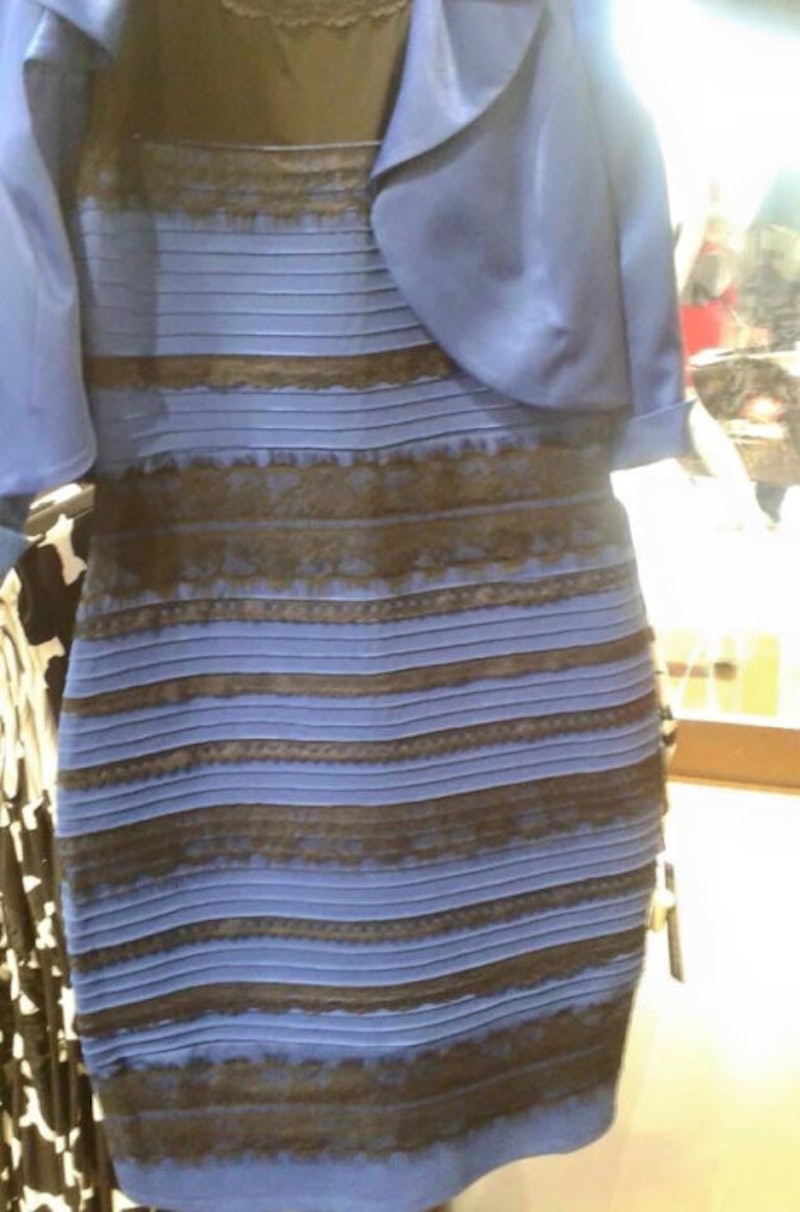
Call me crazy, but the divisive, gendered nature of a silly viral debate over the color of a dress that dominated social media yesterday was, in my opinion, quite reminiscent of the fervor and discord inherent in debates over feminism. From the arguments it sparked between men and women (my Facebook feed was filled with "my BF/husband said white and gold but I think it's black and blue — he's thinks I'm insane") to a scientific explanation that attempted to settle the matter once and for all (which plenty of folks still didn't heed), the tenor of the whole back and forth matched one you'd find between a feminist and a MRA, a Republican lawmaker, or a woman against feminism.
The whole thing began when a Scottish singer posted a picture of a dress on Tumblr and asked what colors people saw because she and her friends couldn't agree, and it eventually became a trending question on Twitter, Facebook, and across the Internet, with celebrities like Taylor Swift and Kim Kardashian weighing in — each one convinced there was a single "right" answer. Sure, there are plenty of polarizing topics where this kind of discussion occurs, but the fact that so many people joined in a fervent dispute centered around a symbol of femininity (the dress) is what first got me thinking of the feminism parallel.
If this connection sounds absurd to you, then maybe I'm a "white and gold" person and you're a "black and blue" type, so whatever I write is going to sound like nonsense — but humor me anyways. These are four ways that I found "the dress" debate to be similar to contemporary discourse for and against feminism.
1. Each side thinks the other is "crazy" or "stupid"
Whenever we cannot see what another person sees, be it a color or a concept, it's easy to attribute the opposite viewpoint to a lack of cognition. Feminists believe women have a long way to go before we achieve gender equality based on, say, the wage gap, increasingly high levels of rape on college campuses, and everyday sexism. Men and women against the movement see feminist activism as destructive and unnecessary, given the number of powerful feminists that dominate popular culture, decreasing rates of male enrollment in higher education, and books by feminists like Hanna Rosin's The End of Men. It's easy for either side to believe the other is "crazy" given how clear the facts are, right?
2. Facts become subjective and are easily manipulated
Speaking of facts, if you think the other side is nuts, then how are you going to believe any "facts" they present? The first response to being given information from a disreputable source that counters your belief system is most likely going to be skepticism. Who cares which study found what, if you think the scientists executing it had an agenda? For this reason, there's no difference between some visual perception expert telling me the color is not what I perceive it to be, and Fox News reporting a study that says abstinence only sex education prevents teen pregnancy. Sorry, just don't buy it.
3. It's all about frame of reference
Until you see for yourself that changing the lighting in your room might change how you view the dress, you'll never look at the colors the way others do. Similarly, feminists and anti-feminists alike have constructed their views based upon their own frames of reference. It is ludicrous to think that barking "facts" at the other side will change anything. A drastic shift has to occur within each individual for them to discern the viewpoints of the other side.
4. Gender is a major player in the debate
It's no coincidence that a woman started this discussion about an emblematic item of women's clothing — the dress is still used to tell genders apart in signage from subways to bathrooms — and it was scoffed at not only because of its annoying ubiquity online, but also because the color of a piece of women's clothing isn't something worth debating in the first place. While the dress might be just a dress, the way we engage with others over "women's issues" is the point, here. If anything, this viral debacle is a useful, low-stakes way to see the function of dissent and the ways we debate with those who happen view the world in ways as different as night and day.
Images: Tumblr/Swiked; Giphy (4)